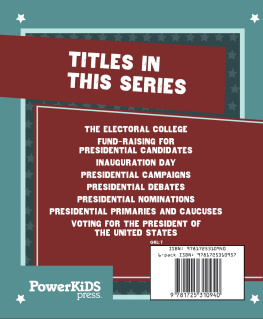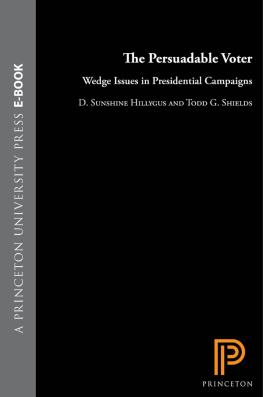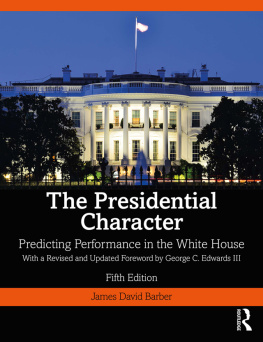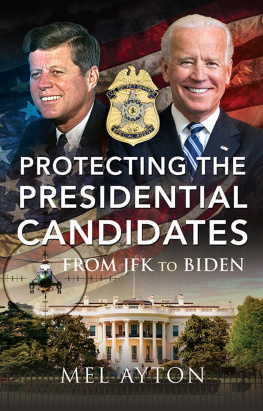Democracy Disrupted
Communication in the Volatile 2020 Presidential Election
Benjamin R. Warner, Dianne G. Bystrom, Mitchell S. McKinney, and Mary C. Banwart, Editors

Copyright 2022 by ABC-CLIO, LLC
All rights reserved. No part of this publication may be reproduced, stored in a retrieval system, or transmitted, in any form or by any means, electronic, mechanical, photocopying, recording, or otherwise, except for the inclusion of brief quotations in a review, without prior permission in writing from the publisher.
Library of Congress Cataloging-in-Publication Data
Names: Warner, Benjamin R., editor. | Bystrom, Dianne G., editor. | McKinney, Mitchell S., editor. | Banwart, Mary C., 1968- editor.
Title: Democracy disrupted : communication in the volatile 2020 presidential election / Benjamin R. Warner, Dianne G. Bystrom, Mitchell S. McKinney, and Mary C. Banwart, Editors.
Description: Santa Barbara : Praeger, [2022] | Includes bibliographical references and index.
Identifiers: LCCN 2022015746 (print) | LCCN 2022015747 (ebook) | ISBN 9781440879234 (cloth) | ISBN 9781440879241 (ebook)
Subjects: LCSH: PresidentsUnited StatesElection2020. | Political campaignsUnited States. | Communication in politicsUnited States. | COVID-19 Pandemic, 2020United States. | Social justiceUnited States. | BISAC: POLITICAL SCIENCE / Political Process / Campaigns & Elections | POLITICAL SCIENCE / Political Ideologies / Democracy
Classification: LCC JK526 2020 .D46 2022 (print) | LCC JK526 2020 (ebook) | DDC 324.973dc23/eng/20220225
LC record available at https://lccn.loc.gov/2022015746
LC ebook record available at https://lccn.loc.gov/2022015747
ISBN: 978-1-4408-7923-4 (print)
978-1-4408-7924-1 (ebook)
26 25 24 23 22 1 2 3 4 5
This book is also available as an eBook.
Praeger
An Imprint of ABC-CLIO, LLC
ABC-CLIO, LLC
147 Castilian Drive
Santa Barbara, California 93117
www.abc-clio.com
This book is printed on acid-free paper 
Manufactured in the United States of America
Contents
Benjamin R. Warner and Dianne G. Bystrom
Bryan G. Pepper and Mitchell S. McKinney
Trevor Parry-Giles, Divine Narkotey Aboagye, Jin R. Choi, Taylor Hourigan, Meg Itoh, Carolyn Robbins, Matthew Salzano, Kalin Schultz, and Shelby Sturm
Julia A. Spiker
Andrea Figueroa-Caballero and Julius Matthew Riles
Xavier Scruggs and Colleen Warner Colaner
Daniel Montez and Kate Kenski
Joshua M. Scacco, Jonathon Smith, and Kevin Coe
Ashley Muddiman and Cameron W. Piercy
Ashley A. Hinck
Kelly L. Winfrey
Robert C. Rowland
Ryan Neville-Shepard
Josh C. Bramlett, Benjamin R. Warner, and Mitchell S. McKinney
Mary C. Banwart and Michael W. Kearney
Benjamin R. Warner, Jihye Park, Go-Eun Kim, and Alyssa N. Coffey
Introduction
Exploring the Disruptive 2020 Campaign: Contextualizing the Role of the Push for Progress, the Pandemic, and the Insurrection at the Capitol
Benjamin R. Warner and Dianne G. Bystrom
On January 6, 2021, U.S. Senator Mitch McConnell (R-KY), then majority leader, had just delivered a speech on the Senate floor in which he warned that any effort to overturn the results of an election that was not unusually close would send our democracy into a death spiral (McConnell, 2021, para. 2). He was referring, of course, to Donald Trumps clear and multifaceted effort to use any tool available to overturn the election (Blake, 2021, para. 19). Less than an hour later, insurrectionists had stormed the U.S. Capitol, hoping to prevent the peaceful transfer of power for the first time since the establishment of the precedent of 1800 (Georgini, 2020).
The harrowing events of January 6, 2021, were the culmination of more than a year of disruptions to the 2020 presidential election. Disruptions interrupt the status quo by challenging the inertia of historical patterns and systems. In this book, we consider the co-occurrence of three historical disruptions: a 100-year pandemic coinciding with the presidential campaign, the diversification of the field of candidates for president preceding a reinvigorated civil rights movement in response to the murder of George Floyd, and the authoritarian lurch that emerged in reaction to Trumps norm- challenging presidency. Our contributors adopt diverse theories and methods to understand these events. Experiments, longitudinal surveys, case studies, and close textual analysis illuminate essential features of this once-in-a-generation campaign.
The first section of this book analyzes the role of diversityespecially regarding issues of race, gender, and sexuality as they affected the 2020 campaign. In one sense, 2020 signaled incredible (if astonishingly slow) progress. Throughout the 59 presidential elections held over the 224-year history of the U.S. presidency, all 46 people selected by the Electoral College have been men45 of whom were White, cisgender, and straight presenting. Only once before has one of the major parties nominated a woman for the presidency (Democrat Hillary Clinton in 2016), and only one Black man (Democrat Barack Obama in 2008 and 2012) has ever been nominated.
Representation in the vice presidency has scarcely been better. As a result of the 2020 presidential election, former U.S. Senator Kamala Harris (D-CA) is the first woman, the first South Asian, and the first Black person to hold the office. Prior to Harris, an uninterrupted line of 48 White, cisgender, and straight-presenting men served as vice president. Indeed, of the more than 100 vice presidential candidates of the two major political parties, only three women (Democrat Geraldine Ferraro in 1984, Republican Sarah Palin in 2008, and Democrat Harris in 2020) have ever been nominated.
Suffice it to say, the executive office has historically looked nothing like the diverse country it seeks to represent. The 2020 election was disruptive of this status quo not only because of the election of Harris but also due to the diversity of the pool of candidates vying for the presidency. When Obama won the presidency in 2008, he did so after emerging from a field of largely traditional candidatesdefeating five White men, one White woman, and one Latino man, all straight-presenting. The 2016 election was the next to feature a competitive Democratic primary and, had either candidate seeking the nomination won the presidency, they would have represented a historical first. Former Secretary of State Clinton would have been the first woman president, and Senator Bernie Sanders (I-VT) would have been the first Jewish president.
The 2020 Democratic primary presents a clear departure from even recent history. Of the 12 candidates that participated in at least three primary debates, four were women, four were candidates of color, and one was an out gay man (the first in U.S. history to seek the office). Two more women participated in at least two primary debates. In total, straight-presenting White men were still overrepresented, comprising 13 of the 23 candidates who participated in at least one debate. Nevertheless, this set of candidates presents a stark contrast to preceding election years. The diversity of the Democratic primary illustrates both progress and constraint. Chapters in this volume consider the historical significance of these candidates while also documenting the ways in which this progress was constrained by the intersecting systems of racism, sexism, and other discriminations imposed by the electorate and, in some cases, by the media.
Just as the diversity in the presidential candidates illustrates the push-pull of progress, so too do the events in the summer of 2020 that engagedand in many ways overshadowedthe campaign. That summer saw a reinvigorated call for social and racial justice in the wake of high-profile police killings, notably the murder of George Floyd by Derek Chauvin in Minneapolis, Minnesota. These protests established the Black Lives Matter movement as the largest in the history of the United States. It is estimated that 15 to 26 million people (up to 10% of the U.S. population) participated in one of the nearly 5,000 protests that occurred in approximately 2,500 cities (Buchanan et al., 2020). Although Floyds murder was the proximate cause of the protests, they were also reacting to a long list of police killings that preceded it, as well as the violent way police responded to protesters and the countless other ways Black lives have been denigrated both before and as a consequence of the COVID-19 pandemic (Bouie, 2020). More than a year after these protests, progress on the injustices that called so many to the streets has been stymied (Booker, 2021).
Next page






